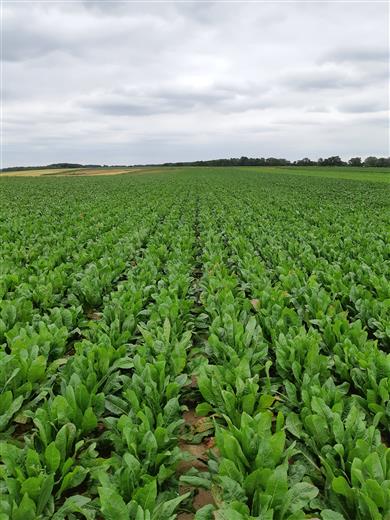
28 Sep 2020
BENEO begins processing the first organic chicory harvest at Oreye
BENEO has a long tradition of partnering with local farmers on the supply of chicory. Now the company’s plant in Oreye, Belgium is the first large-scale facility ever to process prebiotic fibre from organic chicory root.
BENEO, a world leader in healthy ingredients, has announced the completion of the first commercial organically grown chicory campaign. Following a successful harvest during the third week of September, the company will now begin processing organic chicory root fibre at its Oreye plant, in line with growing market demand for organic food ingredients.
BENEO has been producing prebiotic, natural chicory root fibres at Oreye since 1992, by using a gentle hot water extraction method. The plant has a proud tradition of being anchored in Oreye’s local agriculture for more than 130 years, and in having a long-lasting collaboration in place with local farmers. In fact, right now some 700 farmers in the region have chicory contracts in place with BENEO.
Jean Franc, Agro-Manager at BENEO says: “At BENEO we want to provide the world with the best possible ingredients. Chicory is a very healthy and sustainable crop, allowing the production of the natural fibres inulin and oligofructose that support healthy nutrition. As a key player within that space, BENEO is maintaining its leading role by diversifying into organic products. With this we are answering a growing demand from our customers all around the world.”
BENEO has vast experience in offering sustainably sourced and fully traceable natural chicory root fibres. However, diversifying into organic products presents a number of new agronomical and production challenges. One of the requirements is that the production of conventional inulin needs to be clearly separated from the production run of organic inulin. Therefore the production times need to be in sequence and cannot be alternating.
BENEO purchases organically certified chicory root from organically certified local farmers in the area surrounding its Oreye plant. The final chicory root fibre is then certified in the plant by the certification body Certisys.
“At BENEO we decided to start this year’s campaign with the organic crops simply due to the volume of the organic variant. We will need more time for the conventional chicory root which may become too late for harvesting the organic. And interrupting the conventional campaign for the processing of a comparatively small organic product would be inefficient, considering the separation requirements at the factory level,” Jean Franc adds. “In addition, the organic crop requires later seedings as a result of the shorter growing time, harvests of organic chicory are estimated to be lower per hectare, compared to conventional crops. An accepted fact in this first year.”
Production of organic chicory requires intensive manual weeding. Going organic thus incurs higher operational costs for the farmer, both in terms of availability of workers and organisation. “Since organic chicory is grown without plant protection products, farmers must limit the impact of weeds as much as possible,” explains Franc.
With the company’s experience from growing organic sugar beet there is a close cooperation with the chicory farmers to take also this learning step together.
BENEO is supporting local farmers through the purchase of a mechanical weeding system to assist them throughout the growing season. All partner farmers also have a dedicated BENEO agronomist at their disposal throughout the seeding, growing, and harvesting stages. Moreover, farmers are fairly compensated and receive an early delivery premium for their crop. Clear fixed-price contracts are in place between BENEO and its suppliers for full harvests, to ensure the entire crop is purchased and waste avoided.
The harvesting and subsequent processing of conventionally sourced chicory root fibre at BENEO’s Oreye facility will proceed as normal from the third week of September through the remaining weeks of 2020.
The launch of organic inulin and oligofructose complements BENEO’s extensive portfolio of organic rice starches, which are produced at the company’s Wijgmaal facilities.
Reader enquiries
BENEO
Maximilianstraße 10
68165 Mannheim
Germany
Notes for editors
About BENEO Oreye
BENEO’s Oreye plant, formerly known as Orafti (part of Raffinerie Tienen), is a success story in the Walloon region (Belgium). The plant was founded in 1889 and functioned as a sugar beet refinery for more than 100 years. At the beginning of the 1990’s a complete re-engineering of the process was made to turn the factory into a refiner of chicory, supported by important research on technological applications and nutritional benefits of chicory fibres. Since then, the growth has been continuous, and today BENEO is the global market leader in fructans ingredients and a second factory is running since 2006 in South America (Chile). Part of the German-headquartered Südzucker since 1989, the Oreye plant integrated into the newly formed BENEO Group, when Südzucker founded a new three-pronged ingredients business unit in 2007, together with the legacy Remy (Wijgmaal, Belgium) and Palatinit (Mannheim, Germany) businesses.
About BENEO
BENEO offers functional ingredients derived from chicory roots, beet sugar, rice and wheat. BENEO is the ideal partner to help improve a product in its nutritional and technological characteristics. The company employs more than 1000 people and has production units in Belgium, Chile, Germany and Italy.
For further information on BENEO, please visit: www.beneo.com or follow BENEO on Twitter: @_BENEO or LinkedIn: www.linkedin.com/company/beneo.
Related images

BENEO begins processing the first organic chicory harvest at Oreye. (Photo: BENEO, PR004)
Editorial enquiries
Claudia Meissner
Head of Corporate Communication
BENEO
Josina van der Velden
EMG
Also available in